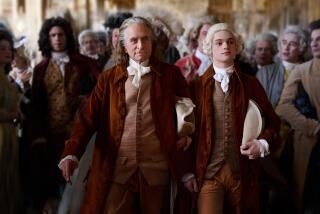At 290, Benjamin Franklin Has Hit the Big Time
He fretted about his weight, obsessed over work, was a guru of self-actualization and a devotee of high tech, had a thing about his image, knew how to have a good time and could spin on any subject.
He, of course, is Ben Franklin, dubbed the “Hot Founding Father” by Rolling Stone magazine.
“Thomas Jefferson may have had his own movie and George Washington may have his own magazine, but they’ve got nothing on Ben Franklin,” Rolling Stone wrote.
*
Early to bed and early to rise makes a man healthy, wealthy and wise.
Where to begin.
This year, Kazuo Majima, a member of Japan’s House of Councillors, translated Franklin’s “Poor Richard’s Almanack” into Japanese.
There is a Franklin exhibit on display in Berlin.
The hottest impersonator among a dozen or so faux Franklins is Philadelphia-based Ralph Archbold. When you call his answering machine, you hear: “This is Ben Franklin.”
These days, Archbold is booked solid.
“I couldn’t be busier,” he says. He travels all over the country with his waistcoat, knee britches and ruffled white shirt. He says his character is as popular with corporate bigwigs, who hire him to entertain at executive gatherings, as it is with people in the street.
“I have homeless people who relate in no way other than to ask people for money, who will light up when I walk near because they see Ben Franklin, and they know Ben Franklin and they know he’s a friend,” Archbold says.
On the international currency market, Ben Franklin took center stage when the U.S. Treasury redesigned his image on the $100 bill, the most widely circulated note outside the United States. The new counterfeit-proof design, a more full-faced shot of the kite flyer, shows him somewhat younger, if rounder and poutier.
*
A penny saved is a penny earned.
On the Internet, there is a profusion of Benjamin Franklin Web sites, everything from essays by children attending schools named for the inventor to historical backgrounders by fan clubs to commercial ads by firms like G. Finkenbeiner Inc. of Boston.
Gerhardt Finkenbeiner produces, for a tiny but growing market, the glass harmonica invented by Franklin--and now a favorite accompaniment for singer Linda Ronstadt.
Even the Benjamin Franklin National Memorial in Philadelphia has a Web page, says executive director Larry Tice. “We get thousands of hits a week.”
This year, both the Discovery and the Arts & Entertainment channels have aired Franklin documentaries.
Sales for the Utah company that makes Franklin Day Planners--printed in English, French, Spanish, Japanese and Chinese--jumped this year by 25%.
At least five new editions of Franklin’s famous autobiography have been published recently, adding to the dozen editions already in existence. (The book was untitled when Franklin wrote it but now is known as “The Autobiography of Benjamin Franklin.”)
At Yale University, where scholars have been painstakingly assembling into volumes everything Franklin wrote and received in correspondence, phone calls have been coming in from an eager public craving a sampling of Franklin trivia or wit.
Says senior research scholar Barbara Oberg: “He really captures people’s imaginations.”
Earlier this year, Franklin made Forbes magazine. There was the grand pooh-bah of American forefathers, his bespectacled bust in the loving embrace of big fan and Los Angeles attorney Charles Munger, as he dispatches crucial financial advice to partner / investor / jillionaire Warren Buffett.
*
Remember that money is of a prolific generating nature. Money can beget money, and its offspring can beget more.
Franklin is also the fave Founding Father for Tony Blankley, the soon-to-be-ex-press secretary for House Speaker Newt Gingrich. Erudite and outspoken, the English-born Blankley is a former Hollywood child actor and lover of the culinary arts who finds in Franklin--a famed appreciator of fine wine and good food--a kindred spirit.
“I always thought of Jefferson as sort of a prig and a showoff and Washington as too distant for me to understand,” Blankley said earlier this year. “Franklin is a very accessible character for a late-20th century person. He was a diplomat and a businessman, creator of short pithy statements and a little bit of a rogue, I guess, in his French years.”
Who knows why a pudgy 18th century genius suddenly turns hot? But come to think of it, it is hard to imagine a time when Franklin was not.
Most scholars agree that it is the richly faceted image of Franklin, as a man of myriad interests and achievements as well as common tastes and weaknesses, that makes him more endearing--and enduring--than other figures of that era.
“He’s the only one you can well imagine sitting down with and telling stories to and being amused by what he had to say. None of the others project that kind of friendly resonance,” says Leo Lemay, a University of Delaware professor of literature who is working on a multi-volumed Franklin biography.
*
Franklin, who was born in Boston in 1706, made his fortune by age 42 as a Philadelphia printer, maker of currency, newspaper and magazine publisher, and postmaster.
Then he retired, devoting the rest of his life to scientific study, civic affairs and international diplomacy. He was instrumental in forming Philadelphia’s first lending library, volunteer fire department, utilities and public hospital.
Franklin, a father of three, studied the science of electricity and the course of the Gulf Stream; invented a stove, bifocals and a flexible catheter. He also drew the first political cartoon in a U.S. newspaper.
Well into his 70s, he became the first U.S. ambassador to Paris, led efforts to obtain French loans and military alliance, and negotiated the treaty ending the Revolutionary War.
When he finally left Europe just shy of 80, he was the most popular American on the continent. Two years later, at 81, he helped craft the Constitution of the United States, quelling a dispute over proportional representation by suggesting that each state elect two senators.
He died in 1790 at 84.
*
In this world, nothing can be said to be certain except death and taxes.
“If nothing else, Ben Franklin lived a full life,” says Franklin impersonator Archbold.
“He was involved in everything. He was enjoying everything. And I think we kind of look toward that. We feel that’s important: the importance of holding onto life and really living it.”
More to Read
Sign up for Essential California
The most important California stories and recommendations in your inbox every morning.
You may occasionally receive promotional content from the Los Angeles Times.










